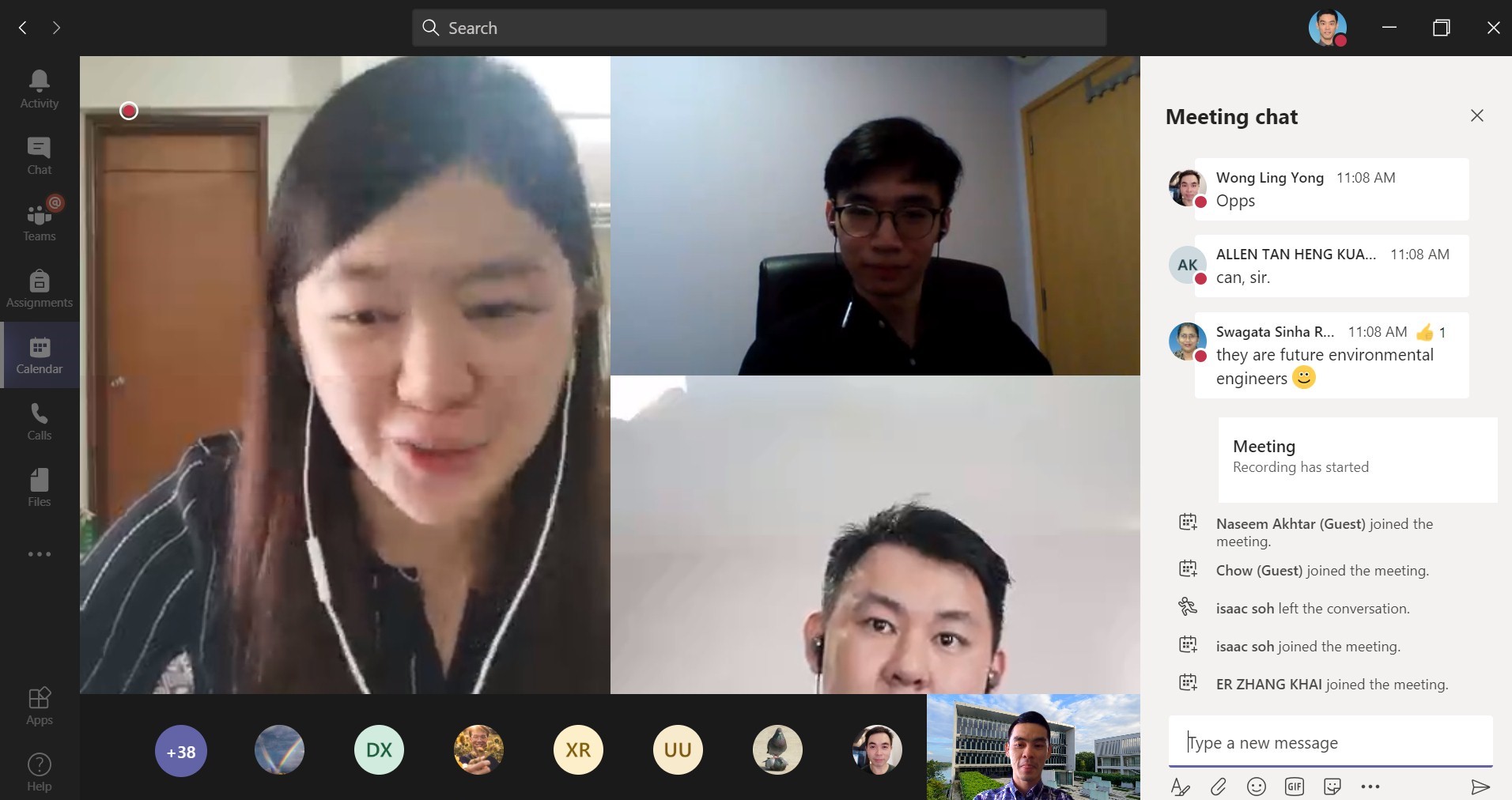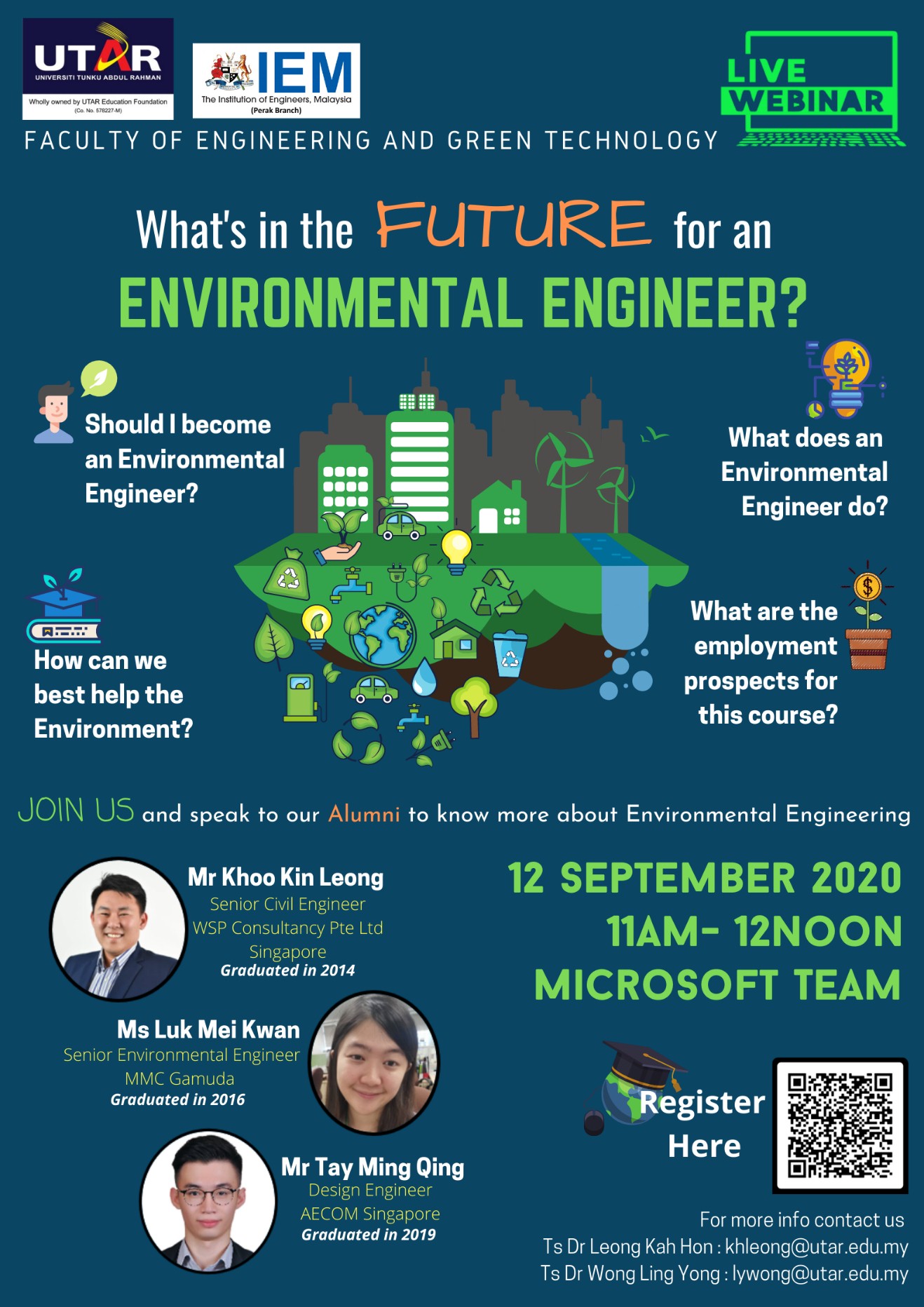
Alumni gives insights on environmental engineering industry

The speakers: Luk (far left), Tay (top right) and Khoo (bottom right)
When experience and knowledge sharing become insightful, participants especially current students who are enrolled in that particular programme will greatly benefit from the sharing session, as proven from the webinar titled “What’s the Future for an Environmental Engineer?”, organised by the Faculty of Engineering and Green Technology (FEGT) on 12 September 2020 via Microsoft Teams.
The webinar aimed to introduce the Environmental Engineering programme and provide career prospects for the programme. The speakers were Senior Civil Engineer of WSP Consultancy Pte Ltd Singapore Khoo Kin Leong, Senior Environment Engineer of MMC Gamuda Luk Mei Kwan, and Design Engineer of AECOM Singapore Tay Ming Qing, all of which are Bachelor of Engineering (Honours) Environmental Engineering alumni. The webinar was moderated by FEGT academic Ts Dr Leong Kah Hon.
Having shared their studies and working experience, the speakers were firstly asked about how they came to know about the programme and reasons for selecting UTAR as their choice for pursuing higher education. Being the most senior, Khoo, who graduated in 2014, commented first and said he was recommended to pursue the programme and eventually found interest in it. Luk and Tay, who graduated in 2016 and 2019 respectively, answered that the dual programme provided them the opportunities to learn both on environmental engineering and civil engineering. With knowledge and skill from both fields, Luk and Tay also said that it was an added advantage as it provided them with wider options when choosing a career to pursue. Despite their differences in opinion, the speakers agreed that their choice to select UTAR was due to its strategic location, which meant it was nearer to their hometowns. More significantly, the speakers expressed their gratitude to UTAR for offering quality and affordable education, which enabled them to pursue their higher education, and mentioned that UTAR being a reputable private university also meant that their certifications are well recognised and accepted by many companies, whether local or abroad.
Flashing back to their years as students in FEGT, Tay recalled enjoying the team assignments because it was a good platform for nurturing teamwork. They also learnt to become effective team players in order to get the assignments completed efficiently. He also said that it was a good training to prepare them for this career. In addition to instilling teamwork and leadership, Luk recalled visiting various sites in relation to the programme, which provided her with much practical knowledge and learning the latest skills applied in the industry. Khoo, who also became a research assistant while studying, said his learning time with his research supervisor exposed him to matters from the industry and he learnt ways to manage clients, which he still applies in his current work.
The highlight of the webinar saw the speakers sharing their life experiences working as engineers. Khoo said his job role enables him to be involved in big infrastructure projects, including drainage design, traffic and even sewage design projects. He also mentioned that site inspection provides him the knowledge and skills to learn ways of incorporating design to suit the current needs and demands of the customers. Tay, who was also involved in drainage project mentioned that his role required him to help contractors solve issues and carry out safety measures. These safety measures ensure the safety of the workers on-site, and that they comply with the safety regulations. Luk, on the other hand, shared that working on matters relating to the environment and constructions required her to look into matters relating to erosion and sediment control. In this case, she said she assisted in implementing the correct solution on site to achieve the desired result. On days when Luk is not visiting the site, she mentioned that she would complete documentation works, which were equally important because their work requires them to work with various authorities and these documents act like proof that the solutions are really implemented well on site.
However fun, the speakers mentioned that they too faced various challenges at work. For Luk, she said the weather was one of the challenges she faced when working on site. She also said that having to deal with complaints from residents required her to use technical knowledge to explain to the residents, as also agreed by Tay, who shared a similar problem. Khoo, recalled having to convince his clients to accept the firm’s proposed design as one of his challenges, citing that clients are always seeking for the lowest cost.
When asked about securing a job in Singapore and Malaysia, the speakers mentioned that the dual programme of Environmental Engineering provided them with wider options. The speakers also reminded interested participants to not be affected by the assumption that this job is more suitable for men than women. Luk also countered that assumption and assured participants that as long one is willing to work hard, no effort will be wasted, and further emphasised that gender is not the determinant of one’s success in securing a job in Environmental Engineering. The speakers also highlighted that although there are differences in engineering roles, for instance, between chemical engineers and environmental engineers, the need to work together to get a task done is still important. They advised participants to look beyond whose roles are better, but rather on how each engineer can use their specific roles to work together to achieve good results.
“The programme offered in UTAR is closely related and very relevant to the industry. This will enable you to acquire the necessary skills and knowledge in the field, which also give you the added advantage to compete with other candidates. During an interview, you will find this knowledge and skills very useful because some employers will quiz you or assign you a task to test your basic understanding of the field and to see how you solve the problems assigned by them. So apart from studying well and working hard, you must use your time wisely to equip yourself with the fundamental knowledge and skills of an environmental engineer, keep yourself updated about the happenings in the industry, and uphold a good attitude during interview and at work,” advised the speakers.
Towards the end of the webinar, the speakers listed a few types of companies that potential environmental engineers can consider when seeking a job, which included construction, resources, and waste management companies. Ending the webinar with some valuable pieces of advice from the speakers, participants were assured that the future of environmental engineers remains positive because of the current world trend that is heading towards green and sustainable developments. They also mentioned that with the rise of increased urbanisation, many more people are moving into the cities, which calls for more infrastructure and developments. With rapid urbanisation and increased need for sustainability, the speakers said that more environmental engineers will be demanded to advise and help these companies achieve that.

Poster of the webinar
![]()
![]()
![]()
© 2020 UNIVERSITI TUNKU ABDUL RAHMAN DU012(A).
Wholly owned by UTAR Education Foundation Co. No. 578227-M LEGAL STATEMENT TERM OF USAGE PRIVACY NOTICE